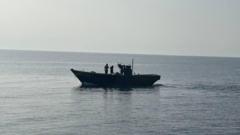South Korea's Ministry of Unification confirmed that they have returned six North Koreans who unintentionally entered South Korean waters earlier this year. The move underscores a continual wish of the six individuals to return to their homeland, as expressed consistently throughout their stay. The repatriated group consists of two individuals who had drifted south in March—remaining in the South for four months, a notable duration for non-defectors—and four sailors who crossed into South Korean territory in May.
This incident marks the first such repatriation under President Lee Jae-myung's administration, whose campaign focused on fostering better relations between the two Koreas. Coordination for the return took considerable time as traditional communication channels have become strained, especially after North Korea severed all lines of communication in April 2023 due to rising tensions. In December, North Korean leader Kim Jong Un declared that unification with South Korea is unattainable.
Efforts by South Korea to send the six individuals back involved attempts to communicate through the United Nations Command, though no responses were received from the North. Observers noted the presence of North Korean patrol vessels at the handover location, hinting at possible behind-the-scenes coordination between the two nations.
Experts are concerned about the potential repercussions for the returnees, who are likely to face a thorough interrogation upon their re-entry into North Korea. Some believe they might be subjected to scrutiny regarding any information or training received during their time in the South. This return further solidifies Kim Jong Un's regime by showcasing that some North Koreans still desire to go back.
Despite the repatriation, there remains skepticism about a genuine improvement in inter-Korean relations. Public sentiment in South Korea indicates limited interest in engaging with the North, more so as it aligns with North Korea's strengthened ties with Russia. As such, analysts project few signs of reinstating productive dialogue or meaningful warmth between the two Koreas in the near future.
Activists, including Lee Min-bok, express disappointment over the repatriation and lament the lack of opportunity for these returnees to learn about South Korean society. This sentiment underlines growing concerns regarding the South Korean administration's approach towards defectors and activists as discussions around banning balloon launches with anti-regime messages are underway. Meanwhile, President Lee Jae-myung's national policy has initiated efforts to rebuild trust, yet analysts remain cautious about the real possibilities of thawing relations between North and South Korea.
This incident marks the first such repatriation under President Lee Jae-myung's administration, whose campaign focused on fostering better relations between the two Koreas. Coordination for the return took considerable time as traditional communication channels have become strained, especially after North Korea severed all lines of communication in April 2023 due to rising tensions. In December, North Korean leader Kim Jong Un declared that unification with South Korea is unattainable.
Efforts by South Korea to send the six individuals back involved attempts to communicate through the United Nations Command, though no responses were received from the North. Observers noted the presence of North Korean patrol vessels at the handover location, hinting at possible behind-the-scenes coordination between the two nations.
Experts are concerned about the potential repercussions for the returnees, who are likely to face a thorough interrogation upon their re-entry into North Korea. Some believe they might be subjected to scrutiny regarding any information or training received during their time in the South. This return further solidifies Kim Jong Un's regime by showcasing that some North Koreans still desire to go back.
Despite the repatriation, there remains skepticism about a genuine improvement in inter-Korean relations. Public sentiment in South Korea indicates limited interest in engaging with the North, more so as it aligns with North Korea's strengthened ties with Russia. As such, analysts project few signs of reinstating productive dialogue or meaningful warmth between the two Koreas in the near future.
Activists, including Lee Min-bok, express disappointment over the repatriation and lament the lack of opportunity for these returnees to learn about South Korean society. This sentiment underlines growing concerns regarding the South Korean administration's approach towards defectors and activists as discussions around banning balloon launches with anti-regime messages are underway. Meanwhile, President Lee Jae-myung's national policy has initiated efforts to rebuild trust, yet analysts remain cautious about the real possibilities of thawing relations between North and South Korea.




















